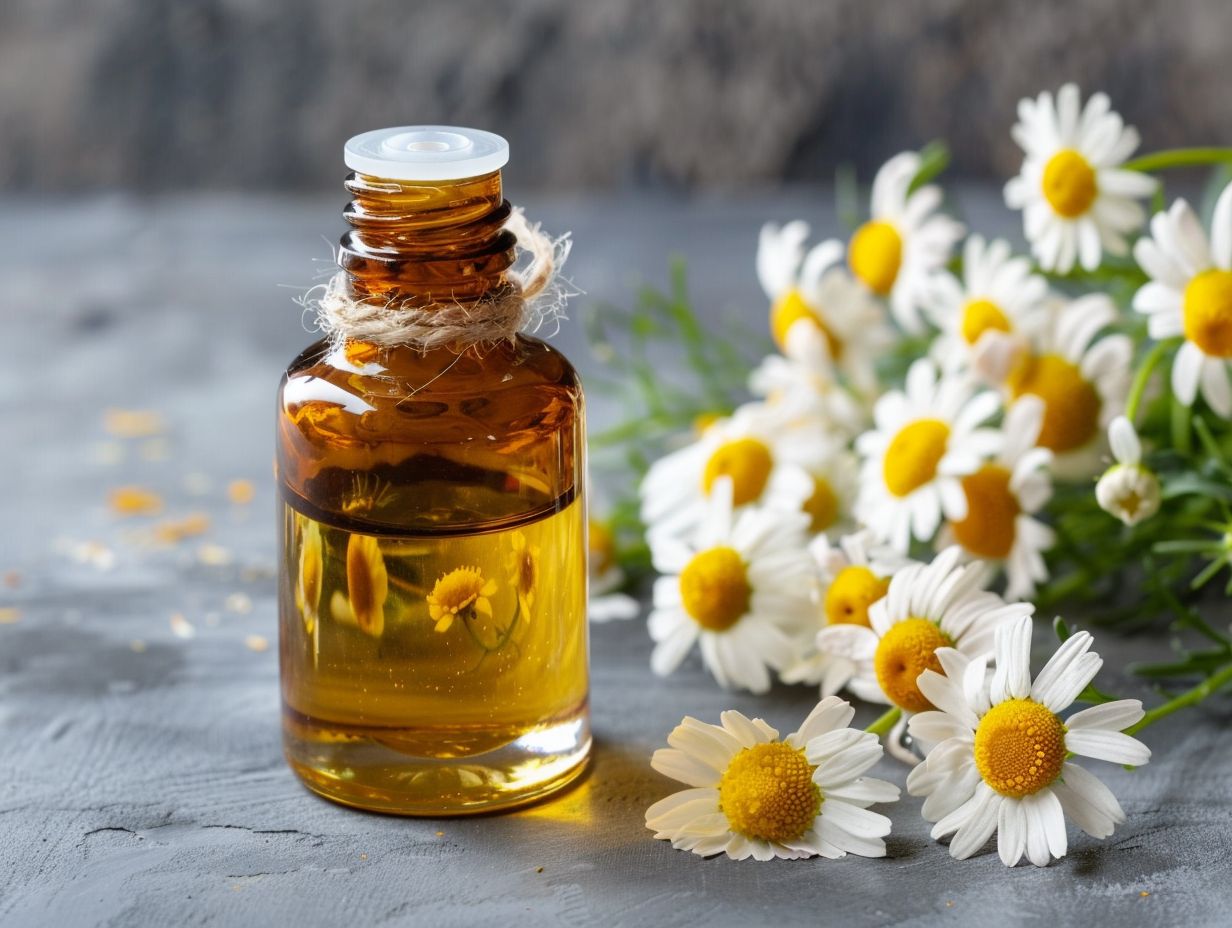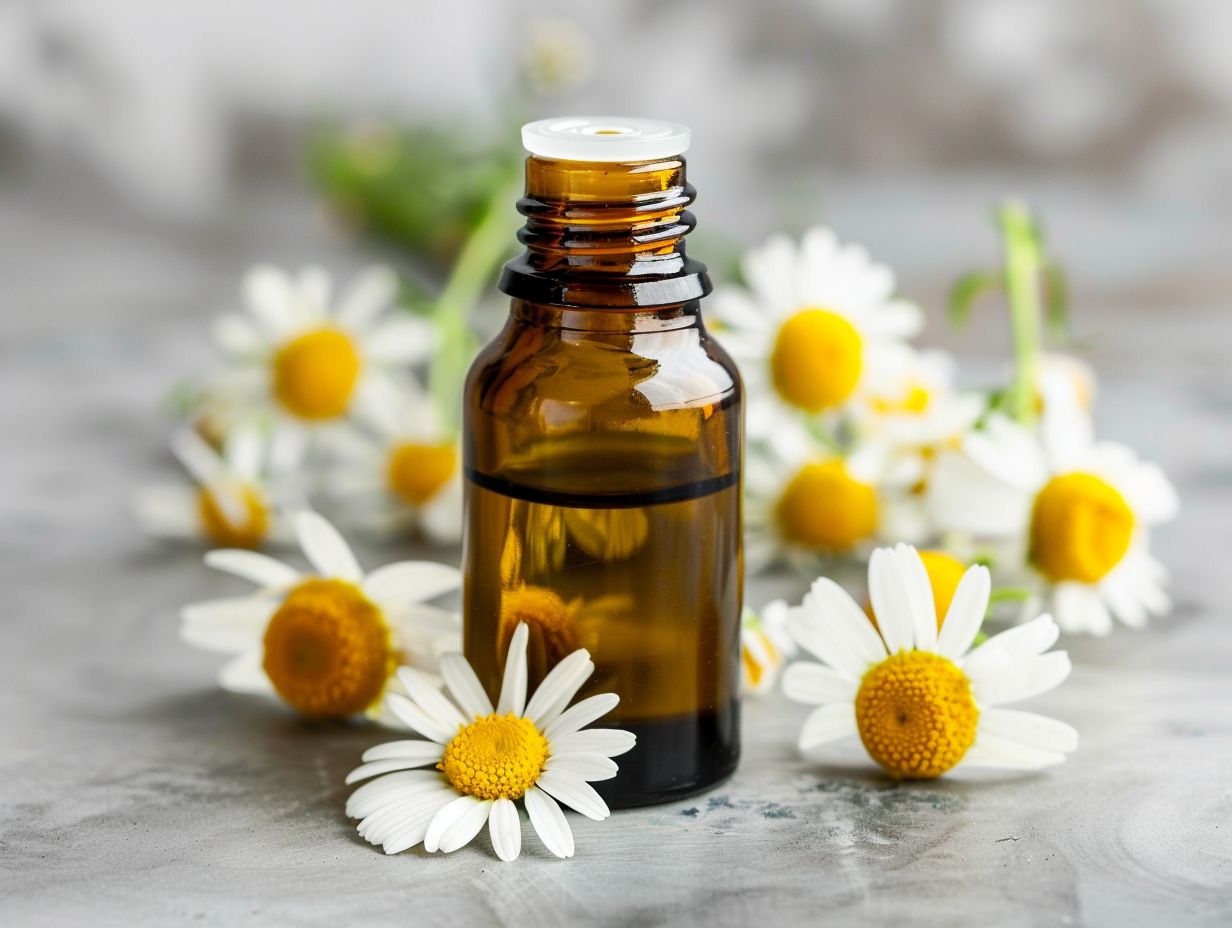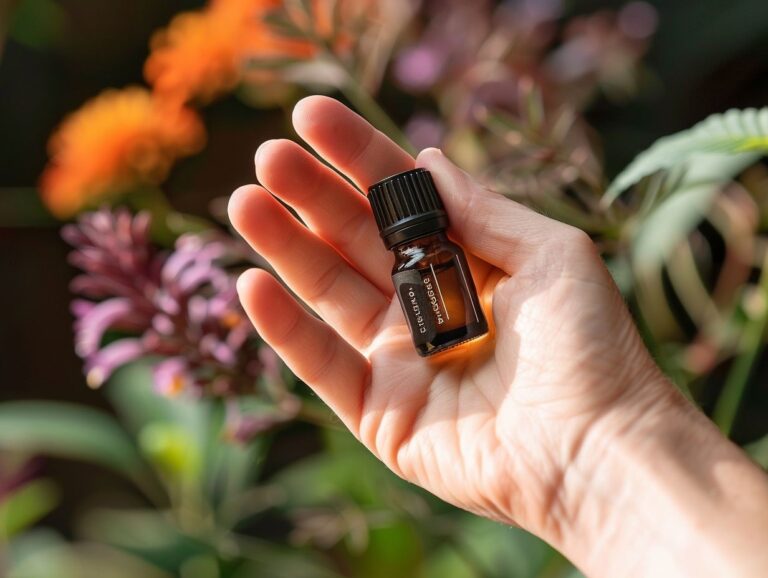Is Chamomile Essential Oils
Curious about the benefits of chamomile essential oils and how they can improve your health and well-being?
We explore what chamomile essential oils are, how they are extracted, and their various uses in aromatherapy, skincare, and digestive aid.
Discover the potential benefits of chamomile essential oils, like reducing anxiety, promoting relaxation, and soothing skin irritations.
Learn about possible side effects and how to use chamomile essential oils safely.
Find out where you can buy these natural remedies!
Key Takeaways:
What Are Chamomile Essential Oils?
Chamomile essential oils are natural extracts derived from the flowers of chamomile plants, including Roman chamomile and German chamomile. These oils are obtained through distillation or extraction methods, capturing the essence and beneficial properties of chamomile daisies.
The use of chamomile for its healing properties dates back centuries. Both Roman and German chamomile offer distinctive benefits: Roman chamomile is known for its calming effects, while German chamomile is often favored for its anti-inflammatory properties. The extraction process involves steaming the flowers to release the aromatic compounds, resulting in a potent oil with a sweet, floral aroma. Chamomile essential oils are widely used in aromatherapy, skincare, and natural remedies for insomnia, anxiety, and skin conditions.
How Are Chamomile Essential Oils Extracted?
Chamomile essential oils are extracted through various methods such as steam distillation or solvent extraction processes. Roman chamomile and German chamomile plants are typically used for extracting these potent oils, ensuring the preservation of their therapeutic properties.
Steam distillation is the most common method for extracting chamomile essential oils, particularly for Roman chamomile. In this process, steam is passed through the chamomile flowers, causing the oil sacs to burst and release the aromatic compounds. The steam carrying the essential oil is then condensed back into a liquid form, separating the oil from the water.
On the other hand, German chamomile is often extracted using solvent extraction, where a solvent is used to absorb the essential oil from the plant material. This method is suitable for extracting oil from delicate flowers.
What Are the Uses of Chamomile Essential Oils?
Chamomile essential oils find versatile applications in aromatherapy, skincare, and digestive wellness. These oils are known for their soothing properties on the skin, calming effects in aromatherapy, and aiding digestion when used appropriately.
In aromatherapy, chamomile essential oils are widely used to promote relaxation, reduce anxiety, and improve sleep quality. The gentle floral scent helps create a serene atmosphere, perfect for unwinding after a long day. When incorporated into skincare products, chamomile oils can help soothe irritation, reduce redness, and hydrate the skin, making them ideal for sensitive or inflamed skin types.
For digestive wellness, chamomile essential oils can be diluted and massaged onto the abdomen to relieve bloating, cramps, and indigestion. The oil’s anti-inflammatory properties can calm an upset stomach and aid in overall digestion. It’s essential to use high-quality oils and follow recommended dilution ratios for safe and effective use in each application.
Aromatherapy
In aromatherapy, chamomile essential oils are prized for their calming aroma and therapeutic benefits. Roman Chamomile EO, in particular, is a popular choice for diffusing blends that promote relaxation and stress relief.
Regarding blending suggestions, Roman Chamomile EO pairs exceptionally well with lavender, bergamot, and frankincense essential oils, creating a harmonious blend that enhances its soothing properties. The delicate floral notes of chamomile blend seamlessly with the citrusy undertones of bergamot and the woody scent of frankincense, resulting in a delightful aroma that uplifts the mood and calms the mind.
In terms of diffuser techniques, adding a few drops of Roman Chamomile EO to a water-based diffuser can help create a tranquil ambiance in any room. The gentle aroma slowly disperses, filling the space with a sense of peace and relaxation, making it ideal for unwinding after a long day or promoting a restful night’s sleep.
Among the unique aroma families associated with Roman Chamomile EO are floral, herbaceous, and slightly sweet. These characteristics make it a versatile oil that can be incorporated into various blends for different purposes, from promoting sleep to soothing skin irritations. Whether used alone or in combination with other essential oils, Roman Chamomile EO holds a special place in aromatherapy for its calming and therapeutic properties.
Skin Care
For skincare, chamomile essential oils offer anti-inflammatory and soothing properties that can benefit various skin conditions. Chamomile oil is gentle and nourishing, making it ideal for addressing sensitive skin concerns.
Chamomile essential oil contains azulene, a compound known for its anti-inflammatory and skin-calming properties, which can help alleviate redness, irritation, and other skin issues. Its regenerative properties can promote a healthy complexion and support skin renewal, making it a popular choice for skincare routines.
To incorporate chamomile oil into your skincare routine, you can add a few drops to your favorite moisturizer or carrier oil for a calming boost. It can also be used as a soothing ingredient in homemade face masks or serums. Always perform a patch test before applying it directly to the skin to ensure compatibility.
Digestive Aid
Chamomile essential oils are known for their digestive benefits, aiding in relieving digestive upset and discomfort. Chamomile tea infused with these oils is a popular choice for soothing digestive issues and promoting overall gut health.
The use of chamomile tea for digestive relief dates back centuries, with its calming properties helping to alleviate indigestion, bloating, and cramps. The essential oils extracted from chamomile contain compounds that assist in reducing inflammation and relaxing the digestive system. They can also aid in easing symptoms of irritable bowel syndrome (IBS) and other gastrointestinal concerns. Chamomile tea may help improve digestion by promoting the production of gastric juices that aid in the breakdown of food.
What Are the Benefits of Chamomile Essential Oils?
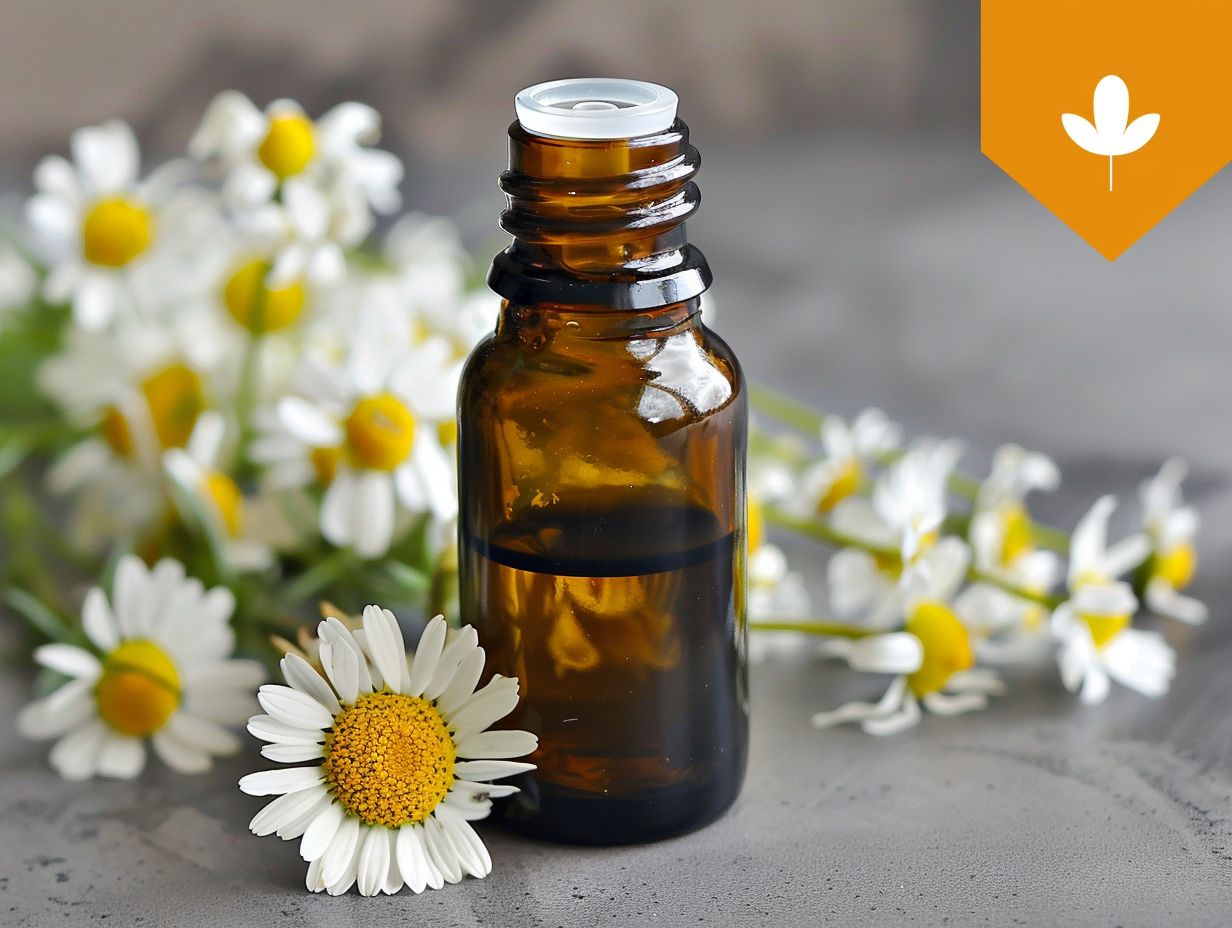
Chamomile essential oils offer a range of benefits, including reducing anxiety, alleviating pain, improving sleep quality, and providing relief from various ailments. These oils have been researched extensively for their therapeutic effects.
One of the most intriguing aspects of chamomile essential oils is their ability to promote relaxation and reduce feelings of stress and anxiety. When inhaled or applied topically, these oils can have a calming effect on the mind and body, helping individuals find a sense of peace and tranquility. The anti-inflammatory properties of chamomile essential oils make them excellent for managing pain and discomfort in conditions such as arthritis or muscle soreness.
Reduces Anxiety and Promotes Relaxation
Chamomile essential oils are renowned for their ability to reduce anxiety and induce a sense of relaxation. Whether used in aromatherapy practices or consumed in chamomile tea, these oils have a calming effect on the mind and body.
One of the reasons behind the anxiety-reducing properties of chamomile essential oils lies in their ability to interact with the olfactory system, triggering the release of neurotransmitters that promote feelings of calmness and relaxation. When inhaled through diffusers or applied topically, the gentle aroma of chamomile oil can soothe frayed nerves and ease tension.
For optimal results in aromatherapy, it is recommended to dilute chamomile oil with a carrier oil and apply it to pulse points or use it in a diffuser. The inhalation of these oils can create a tranquil environment that promotes a sense of well-being.
Helps with Sleep Issues
Chamomile essential oils can aid in addressing sleep issues and promoting restful sleep patterns. Incorporating chamomile tea infused with these oils before bedtime can enhance relaxation and contribute to better sleep quality.
Known for its calming and soothing properties, chamomile essential oils can help alleviate stress and anxiety, creating a tranquil environment conducive to sleep. The gentle aroma of chamomile can also act as a natural sedative, preparing the mind and body for a restful night’s sleep.
For those struggling with insomnia or irregular sleep patterns, incorporating chamomile essential oils into a bedtime routine can establish a sense of relaxation and ease, promoting a more consistent sleep schedule. Whether diffused in a bedroom or added to a warm bath, the subtle fragrance of chamomile can create a comforting atmosphere ideal for winding down before sleep.
Soothes Skin Irritations
Chamomile essential oils possess anti-inflammatory properties that make them effective in soothing skin irritations and conditions.
These oils are gentle and suitable for all skin types, making them a versatile option for those with sensitive skin. Whether dealing with redness, itchiness, or dryness, chamomile oil can provide a calming effect and reduce discomfort. Plus its anti-inflammatory benefits, chamomile oil is also rich in antioxidants, which help protect the skin from environmental stressors and promote overall skin health.
Relieves Menstrual Cramps
Chamomile essential oils are known to offer relief from menstrual cramps and discomfort. Incorporating chamomile tea infused with these oils during menstrual cycles can help alleviate pain and promote relaxation.
Chamomile essential oil contains compounds that have anti-inflammatory and muscle-relaxing properties, making it an effective natural remedy for menstrual cramps. When applied topically or inhaled through aromatherapy, chamomile can reduce the intensity of cramps and bloating. The calming effects of chamomile help to reduce stress and anxiety levels often experienced during menstruation, further enhancing its pain-relieving benefits.
Are There Any Side Effects of Chamomile Essential Oils?
While chamomile essential oils are generally safe for most individuals, there can be potential side effects such as allergic reactions, skin sensitivity, and interactions with certain medications. It is essential to be aware of these risks before using chamomile oils.
Allergic reactions to chamomile essential oils can manifest as skin rashes, itching, or respiratory issues in some individuals. It is crucial to perform a patch test before using these oils topically to check for any adverse reactions.
Individuals with sensitive skin should dilute chamomile oils with a carrier oil before application to reduce the risk of skin irritation or redness.
It is imperative to consult a healthcare provider or a qualified aromatherapist to determine any potential drug interactions between chamomile oils and medications, especially if one is on prescribed drugs.
Allergic Reactions
Some individuals may experience allergic reactions to chamomile essential oils, resulting in skin irritation or respiratory issues. It is crucial to perform a patch test before using these oils and seek medical advice if allergic symptoms occur.
Allergic reactions to chamomile essential oils can manifest as redness, itching, swelling, or even hives on the skin. In more severe cases, individuals may experience difficulty breathing, chest tightness, or throat swelling if exposed to chamomile oil. These reactions can be especially dangerous for those with known allergies or sensitivities to plants in the Asteraceae family, which chamomile belongs to.
Before incorporating chamomile essential oils into your skincare or aromatherapy routine, conducting a patch test is essential. Dab a diluted solution of chamomile oil on a small area of skin and observe for at least 24 hours for any adverse reactions. If any itching, redness, or discomfort occurs, discontinue use immediately. Seeking advice from a healthcare professional is crucial if severe allergic symptoms present themselves.
Skin Sensitivity
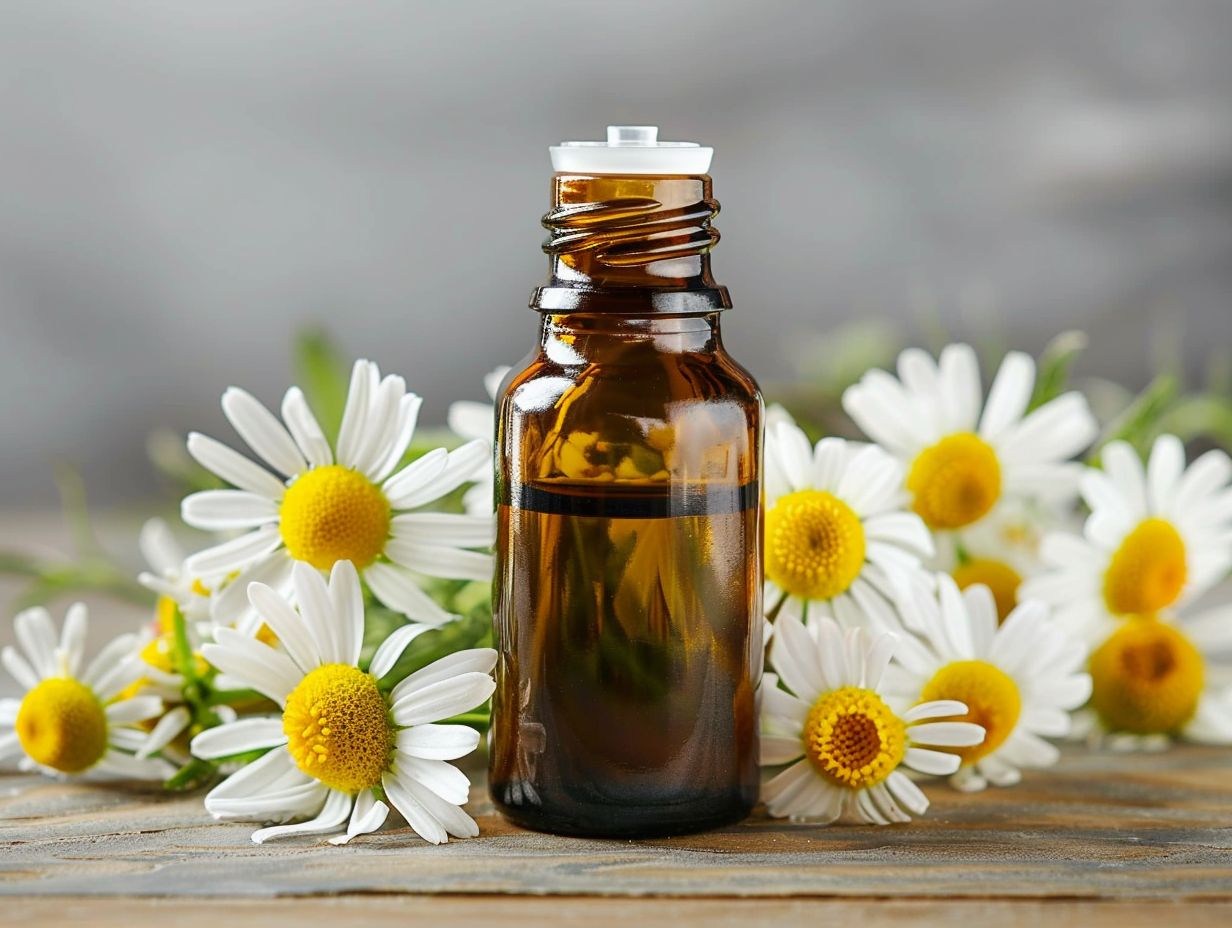
Chamomile essential oils may cause skin sensitivity in some individuals, especially those with sensitive skin or existing skin conditions. It is recommended to dilute chamomile oil properly and avoid direct contact with sensitive skin areas.
This precaution is essential because undiluted chamomile oil can lead to skin irritation, redness, or even allergic reactions. Diluting the oil with a carrier oil like jojoba or coconut oil helps reduce the concentration of the essential oil, making it safer for application.
Performing a patch test before using chamomile oil on a larger area of skin is highly advisable. This test involves applying a small amount of diluted oil on a small patch of skin to check for any adverse reactions before full application.
Interactions with Medications
Chamomile essential oils can interact with certain medications, affecting their efficacy or causing adverse reactions. Individuals should consult a healthcare provider or pharmacist to understand potential drug interactions before using chamomile oils.
It is crucial to recognize that the FDA offers recommendations regarding the safe consumption of essential oils with prescription medications, underlining the significance of adhering to these guidelines.
Some medications, such as blood thinners or sedatives, may pose higher risks when combined with chamomile oils, necessitating caution and awareness. Seeking advice from a trained healthcare professional can provide tailored insights into the specific risks associated with combining oils and prescribed drugs.
Professional guidance ensures a proactive approach to safeguarding one’s well-being and avoiding any potential complications.
How to Use Chamomile Essential Oils Safely?
To use chamomile essential oils safely, it is crucial to dilute them properly, perform a patch test before application, and seek medical advice if pregnant or breastfeeding. Following these safety guidelines ensures the effective and secure use of chamomile oils.
Proper dilution is key when using chamomile essential oils to avoid skin irritation or sensitization. For adults, a safe dilution ratio is typically around 1-2%. Start with a lower concentration and increase gradually if needed. Conduct a patch test by applying a small amount of diluted oil to a small area of skin and wait to observe any adverse reactions for at least 24 hours.
During pregnancy or breastfeeding, it is essential to consult with a healthcare professional before using chamomile oil. Pregnant women should especially avoid using chamomile oil internally without medical supervision. For breastfeeding moms, consulting a healthcare provider can help ensure that the oil is safe for both the mother and baby.
Dilute Properly
Diluting chamomile essential oils is essential to prevent skin irritation and sensitivities. Understanding the appropriate dilution ratios and selecting high-quality oils from reputable sources, such as FDA-approved suppliers, ensures the safe application of chamomile oils.
Proper dilution of essential oils, particularly chamomile, not only safeguards against adverse skin reactions but also maximizes the benefits of aromatherapy. When diluting chamomile oil, a common guideline is to use a dilution ratio of 1-3%, meaning 1-3 drops of essential oil per teaspoon of carrier oil. Individuals with sensitive skin may opt for even lower concentrations. Cultivation practices also play a vital role in the quality of chamomile oils; organically grown chamomile ensures purity and potency without harmful pesticides or chemicals. Sourcing oils from reputable suppliers who adhere to strict quality standards is crucial for obtaining oils devoid of contaminants or adulterations, ensuring a safe and effective experience.
Patch Test Before Use
Conducting a patch test before using chamomile essential oils is crucial to identify potential allergic reactions or skin sensitivities. Applying a diluted solution on a small skin area and observing for any adverse reactions helps determine individual skin compatibility.
This process is particularly essential because chamomile essential oil, known for its anti-inflammatory and calming properties, may still trigger reactions in sensitive individuals.
During the observation period, typically 24-48 hours, it is vital to check for signs of redness, itching, swelling, or any other unusual skin responses. If any adverse reactions are observed, immediate cessation of use and consulting a dermatologist are highly recommended to prevent further complications.
Patch testing provides a proactive approach to skincare by ensuring safety and efficacy before incorporating chamomile essential oils into daily routines.
Consult a Doctor if Pregnant or Breastfeeding
Pregnant or breastfeeding individuals should consult a healthcare provider before using chamomile essential oils. Due to potential risks and contraindications, professional advice helps in determining the safe usage and dosage of chamomile oils during these stages.
It is crucial for expecting or nursing mothers to be aware that chamomile essential oils are potent substances that may have effects on their health and that of their baby. A healthcare provider can offer personalized guidance and recommendations, taking into account any existing medical conditions, allergies, or sensitivities.
Adjustments in dosage may be necessary to ensure the safety of both the mother and the infant. Overconsumption or improper use of chamomile oils can lead to adverse reactions, including skin irritations, allergic responses, or internal complications.
Always verify the quality and purity of the chamomile oil being used, as adulterated or low-grade products may pose additional risks to pregnant and breastfeeding women.
Where Can You Buy Chamomile Essential Oils?
Chamomile essential oils are available for purchase from reputable suppliers such as Eden Botanicals, offering a range of options including Roman Chamomile EO. These oils are sourced from trusted origins and meet quality standards.
Roman Chamomile EO, known for its soothing properties, is extracted from the blossoms of the Chamaemelum nobile plant, native to Western Europe. The extraction process involves steam distillation, ensuring the preservation of the oil’s beneficial compounds.
When selecting chamomile essential oils, it is crucial to prioritize high-quality options to reap their full benefits. Opt for oils from reputable sources like Eden Botanicals, known for their commitment to sourcing pure and authentic products.
Frequently Asked Questions
Is Chamomile Essential Oils safe to use on sensitive skin?
Yes, Chamomile Essential Oils is safe to use on sensitive skin. It has anti-inflammatory properties that can soothe and calm irritated skin.
Can Chamomile Essential Oils be used as a natural sleep aid?
Yes, Chamomile Essential Oils is known for its calming and relaxing properties, making it a popular choice for promoting a good night’s sleep.
Is Chamomile Essential Oils safe for children?
Yes, Chamomile Essential Oils is generally safe for children. However, it is always recommended to dilute the oil and do a patch test before using it on children.
Can Chamomile Essential Oils be ingested?
No, Chamomile Essential Oils should not be ingested. It is meant for external use only.
How can I use Chamomile Essential Oils for relaxation?
You can use Chamomile Essential Oils in a diffuser, add a few drops to a warm bath, or dilute it in a carrier oil and use it for a relaxing massage.
Is Chamomile Essential Oils safe to use during pregnancy?
It is recommended to consult with a healthcare professional before using Chamomile Essential Oils during pregnancy. Some sources suggest avoiding it during the first trimester.

